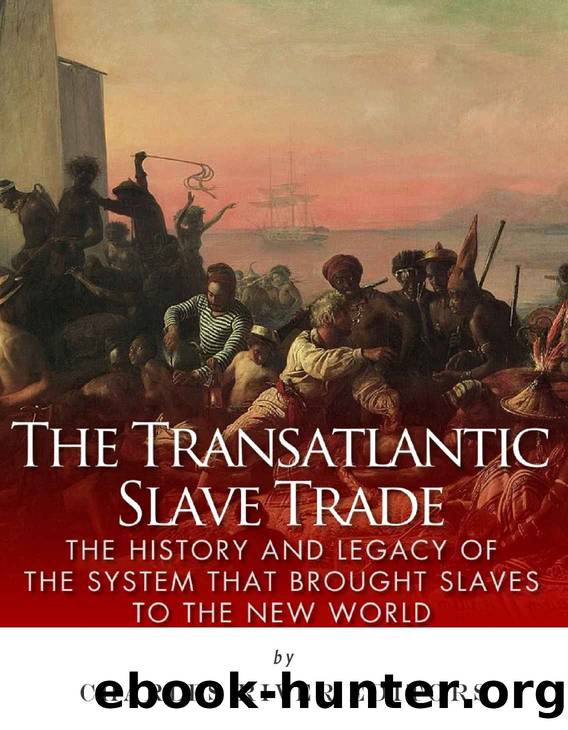The Transatlantic Slave Trade: The History and Legacy of the System that Brought Slaves to the New World by Charles River Editors

Author:Charles River Editors
Language: eng
Format: epub
Publisher: Charles River Editors
Published: 2015-05-19T00:00:00+00:00
In the entire pantheon of horrors that attended the Atlantic Slave Trade, the rigors of the Middle Passage arguably rank the worst. Naturally, it was people like Alexander Falconbridge and John Newton who emerged as the most passionate and vocal supporters of abolition after they had witnessed these dehumanizing circumstances for long periods.[3]
Chapter 4: Across the Atlantic
Depiction of a sugarcane plantation
Upon their arrival, the slavesâ experience in the new world varied very much according to location and the circumstances under which each individual slave found himself or herself. Generally speaking, slavery in the New World had an industrial flavor that ancient systems of slavery did not; certainly in the African context, slavery had long existed, but it did so under loosely defined conventions, and usually in terms of war booty or as a response to criminality of some sort or another. Slaves were held within established traditions of society and utilized principally within concubinage or domestic service, with some defined term of bondage that ended at a certain point or with manumission offered under certain conditions. At no time in history prior to the advent of the Transatlantic slave trade was slavery regarded as an economic phenomenon, similar to the way fossil fuels or electricity might now be regarded as a source of expendable agricultural or economic power.
The history of the New World economies and the history of slavery are inseparable from one another, and each are associated primarily with the production of sugar, cotton and tobacco. It is a fact that the aboriginal peoples of the Americas withered away almost at the moment that white contact with their land mass took place. This happened mostly because of the introduction of exotic disease and alcohol than the predations of slavery, and furthermore, Native Americans were emotionally and physically unsuited to the style of labor that the Portuguese demanded as they began to establish the first commercial sugar plantations in Brazil. Even without alcohol and disease, it would seem unlikely that the Europeans would have ever considered any indigenous society as a viable source of labor.
Europe was introduced to sugar by the Arabs in the 15th century, which coincided with the Portuguese and Spanish advances in Africa and the Americas. The commodity was well received, quite naturally, after which a market was formed and rapidly grew. Sugar was at first grown among the Mediterranean islands, but demand so quickly began to exceed supply that the crop was established in Brazil, Cuba, Mexico and the Caribbean as well. This prompted the rapid growth of a plantation economy that attracted not only Iberian immigrant farmers but also British, French and Dutch farmers. As the industry grew, so did the importation of slave labor.
In terms of the conditions that greeted new arrivals in the Americas, these varied with destination. However, the dehumanizing process that had begun on the African mainland, and which was reinforced by the conditions of the Middle Passage, was usually refined considerably at the point of sale. This dehumanization, however, as
Download
This site does not store any files on its server. We only index and link to content provided by other sites. Please contact the content providers to delete copyright contents if any and email us, we'll remove relevant links or contents immediately.
| Africa | Americas |
| Arctic & Antarctica | Asia |
| Australia & Oceania | Europe |
| Middle East | Russia |
| United States | World |
| Ancient Civilizations | Military |
| Historical Study & Educational Resources |
Machine Learning at Scale with H2O by Gregory Keys | David Whiting(4296)
Never by Ken Follett(3937)
Fairy Tale by Stephen King(3372)
Oathbringer (The Stormlight Archive, Book 3) by Brandon Sanderson(3162)
The Man Who Died Twice by Richard Osman(3073)
Will by Will Smith(2912)
Rationality by Steven Pinker(2352)
Can't Hurt Me: Master Your Mind and Defy the Odds - Clean Edition by David Goggins(2325)
The Dark Hours by Michael Connelly(2300)
Friends, Lovers, and the Big Terrible Thing by Matthew Perry(2220)
The Dawn of Everything: A New History of Humanity by David Graeber & David Wengrow(2197)
Principles for Dealing With the Changing World Order: Why Nations Succeed and Fail by Ray Dalio(2043)
A Short History of War by Jeremy Black(1843)
HBR's 10 Must Reads 2022 by Harvard Business Review(1840)
Go Tell the Bees That I Am Gone by Diana Gabaldon(1754)
A Game of Thrones (The Illustrated Edition) by George R. R. Martin(1728)
Kingdom of Ash by Maas Sarah J(1668)
515945210 by Unknown(1663)
443319537 by Unknown(1546)
